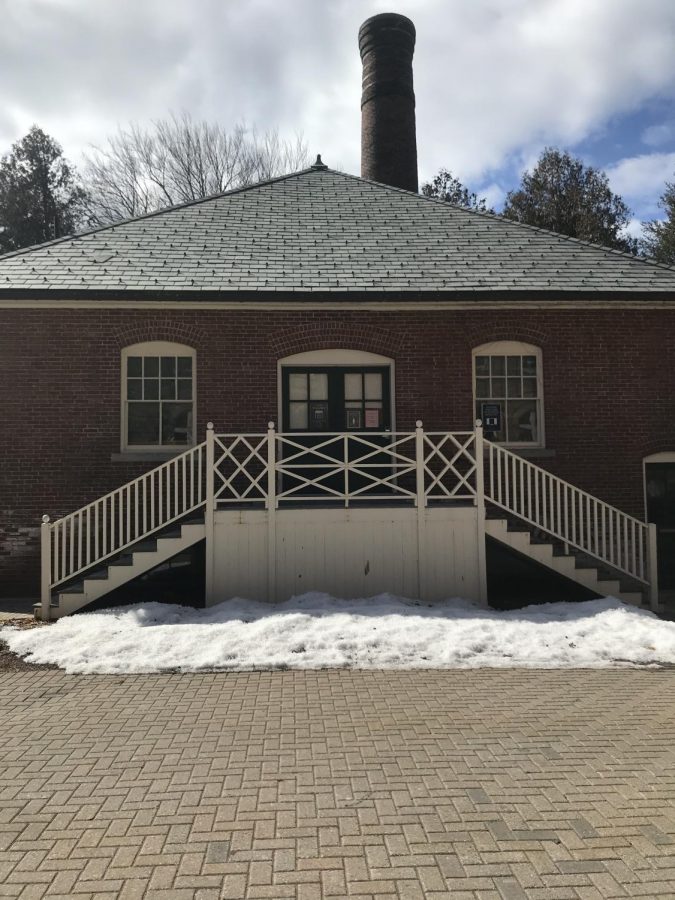Grappone Humanities Center finds new home in print shop
The print shop currently stands behind the historic Alumni Hall.
March 31, 2021
Since its establishment in early 2018, the Grappone Humanities Institute has fulfilled its mission to “reach across our campus and surrounding communities to engage people of all backgrounds with questions and ideas that arise from our common and uncommon experiences,” yet has had no physical location to call its own. Three years after its beginnings, in a March 10 virtual Town Hall, President Favazza announced that the Board of Trustees had approved plans to renovate the print shop behind Alumni Hall into a 2-story space for the Humanities Institute.
While the campaign is still in its fundraising phase, seeking leadership gifts and financial pledges, construction could begin by 2022 at the earliest, projecting the center’s opening date to late 2022 or early 2023. President Favazza said that, besides being “very excited about this building project,” he believes that, “the building will make a powerful statement about the centrality of the humanities to the mission of Saint Anselm College.”
Professor Bouchard, the Executive Director of the Institute, said that in the earliest initial discussions about something like a humanities institute, everyone involved in the conversation was from humanities departments. He said that, “Feeling rightly the pressure of STEM and pre professional majors,” their thinking centered around “how to save and elevate the humanities.”
In the process of founding the Grappone Humanities Institute, their primary goal became to broaden its vision and include students and faculty of every department and major, “because we’re all human beings,” says Professor Bouchard. Integrating “not just faculty but staff, not just students who are majoring in philosophy or English, but students who are majoring in computer science or nursing” became central to the mission of the Institute.
Senior Hannah Beaudry, currently an intern with the Humanities Institute, said that “it is only natural that the Humanities Institute would have a physical presence on campus!” Echoing President Favazza’s statement, she said that “This building shows the college’s commitment to bringing people together and fostering dialogue.” Highly valuing community and education are deeply characteristic of Saint Anselm as a school, so it seems even more natural that the Humanities Institute works to emphasize that.
The print-shop-turned-Humanities-Institute will accommodate events such as readings, forums, exhibits, small concerts, and various things to invigorate campus while maintaining a strong focus on the humanities. Professor Bouchard expressed hopes that having a building dedicated to this goal will allow the Institute to expand its influence beyond the reaches of the campus community, emphasizing its inclusive mission. He suggests that a dedicated building will allow the Institute to extend this kind of hospitality to the outside community in a way that it simply can’t without a physical location.
The Institute’s current programming includes the weekly Come Friday Forums – discussions on topics ranging from “Do we live in a more violent age than the past?” to “What makes something funny?” These discussions are currently held both in person and over Zoom and are led by faculty from a range of departments.
In addition, the Institute sponsors or co-sponsors 2-4 programs per year on a bigger scale than the Come Friday Forums. Topics for these are likewise academically diverse and have included Leo Tolstoy, Women’s Suffrage, Liberal Arts and Careers, and poetry readings. Professor Bouchard said that the vision for the future of the Institute is to continue representing diversity of academic disciplines, ideally with professors and students from every department participating in events.
The Institute’s current Reimagining Justice Series, in partnership with the Criminal Justice Department, Alumni Relations, and Anselmian Network for Racial Justice is an important example of this, linking the field of criminal justice with the humanities. As Professor Bouchard said, “Justice is a fundamental human value,” and drawing these significant connections between fields is a large part of why the Grappone Humanities Institute exists.
As the NHIOP (which likewise began in a corner of an office filled with boxes and files), is to politics, so the Grappone Humanities Institute hopes to be for the humanities in southern New Hampshire. As President Favazza said, “It amplifies Saint Anselm’s commitment to the liberal arts as core to our curriculum and student experience.” Perhaps the significance of having a building dedicated to the humanities is best summed up in Professor Bouchard’s slogan for the Institute: “Humanity: Everyone’s a member.”



